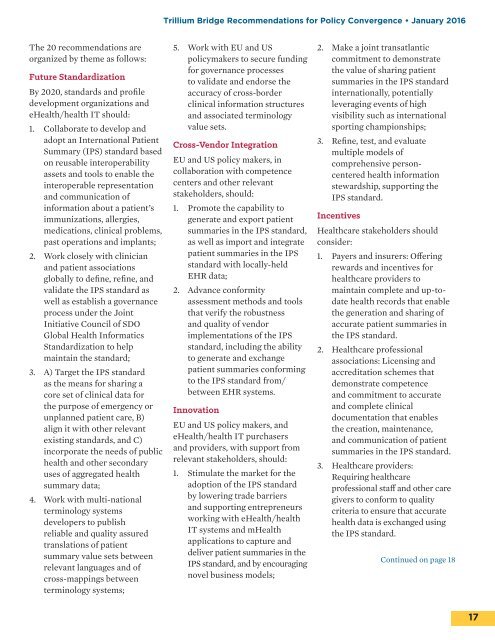In this Issue HL7 News
HL7_NEWS_20160111
HL7_NEWS_20160111
Create successful ePaper yourself
Turn your PDF publications into a flip-book with our unique Google optimized e-Paper software.
Trillium Bridge Recommendations for Policy Convergence • January 2016<br />
The 20 recommendations are<br />
organized by theme as follows:<br />
Future Standardization<br />
By 2020, standards and profile<br />
development organizations and<br />
eHealth/health IT should:<br />
1. Collaborate to develop and<br />
adopt an <strong>In</strong>ternational Patient<br />
Summary (IPS) standard based<br />
on reusable interoperability<br />
assets and tools to enable the<br />
interoperable representation<br />
and communication of<br />
information about a patient’s<br />
immunizations, allergies,<br />
medications, clinical problems,<br />
past operations and implants;<br />
2. Work closely with clinician<br />
and patient associations<br />
globally to define, refine, and<br />
validate the IPS standard as<br />
well as establish a governance<br />
process under the Joint<br />
<strong>In</strong>itiative Council of SDO<br />
Global Health <strong>In</strong>formatics<br />
Standardization to help<br />
maintain the standard;<br />
3. A) Target the IPS standard<br />
as the means for sharing a<br />
core set of clinical data for<br />
the purpose of emergency or<br />
unplanned patient care, B)<br />
align it with other relevant<br />
existing standards, and C)<br />
incorporate the needs of public<br />
health and other secondary<br />
uses of aggregated health<br />
summary data;<br />
4. Work with multi-national<br />
terminology systems<br />
developers to publish<br />
reliable and quality assured<br />
translations of patient<br />
summary value sets between<br />
relevant languages and of<br />
cross-mappings between<br />
terminology systems;<br />
5. Work with EU and US<br />
policymakers to secure funding<br />
for governance processes<br />
to validate and endorse the<br />
accuracy of cross-border<br />
clinical information structures<br />
and associated terminology<br />
value sets.<br />
Cross-Vendor <strong>In</strong>tegration<br />
EU and US policy makers, in<br />
collaboration with competence<br />
centers and other relevant<br />
stakeholders, should:<br />
1. Promote the capability to<br />
generate and export patient<br />
summaries in the IPS standard,<br />
as well as import and integrate<br />
patient summaries in the IPS<br />
standard with locally-held<br />
EHR data;<br />
2. Advance conformity<br />
assessment methods and tools<br />
that verify the robustness<br />
and quality of vendor<br />
implementations of the IPS<br />
standard, including the ability<br />
to generate and exchange<br />
patient summaries conforming<br />
to the IPS standard from/<br />
between EHR systems.<br />
<strong>In</strong>novation<br />
EU and US policy makers, and<br />
eHealth/health IT purchasers<br />
and providers, with support from<br />
relevant stakeholders, should:<br />
1. Stimulate the market for the<br />
adoption of the IPS standard<br />
by lowering trade barriers<br />
and supporting entrepreneurs<br />
working with eHealth/health<br />
IT systems and mHealth<br />
applications to capture and<br />
deliver patient summaries in the<br />
IPS standard, and by encouraging<br />
novel business models;<br />
2. Make a joint transatlantic<br />
commitment to demonstrate<br />
the value of sharing patient<br />
summaries in the IPS standard<br />
internationally, potentially<br />
leveraging events of high<br />
visibility such as international<br />
sporting championships;<br />
3. Refine, test, and evaluate<br />
multiple models of<br />
comprehensive personcentered<br />
health information<br />
stewardship, supporting the<br />
IPS standard.<br />
<strong>In</strong>centives<br />
Healthcare stakeholders should<br />
consider:<br />
1. Payers and insurers: Offering<br />
rewards and incentives for<br />
healthcare providers to<br />
maintain complete and up-todate<br />
health records that enable<br />
the generation and sharing of<br />
accurate patient summaries in<br />
the IPS standard.<br />
2. Healthcare professional<br />
associations: Licensing and<br />
accreditation schemes that<br />
demonstrate competence<br />
and commitment to accurate<br />
and complete clinical<br />
documentation that enables<br />
the creation, maintenance,<br />
and communication of patient<br />
summaries in the IPS standard.<br />
3. Healthcare providers:<br />
Requiring healthcare<br />
professional staff and other care<br />
givers to conform to quality<br />
criteria to ensure that accurate<br />
health data is exchanged using<br />
the IPS standard.<br />
Continued on page 18<br />
17


